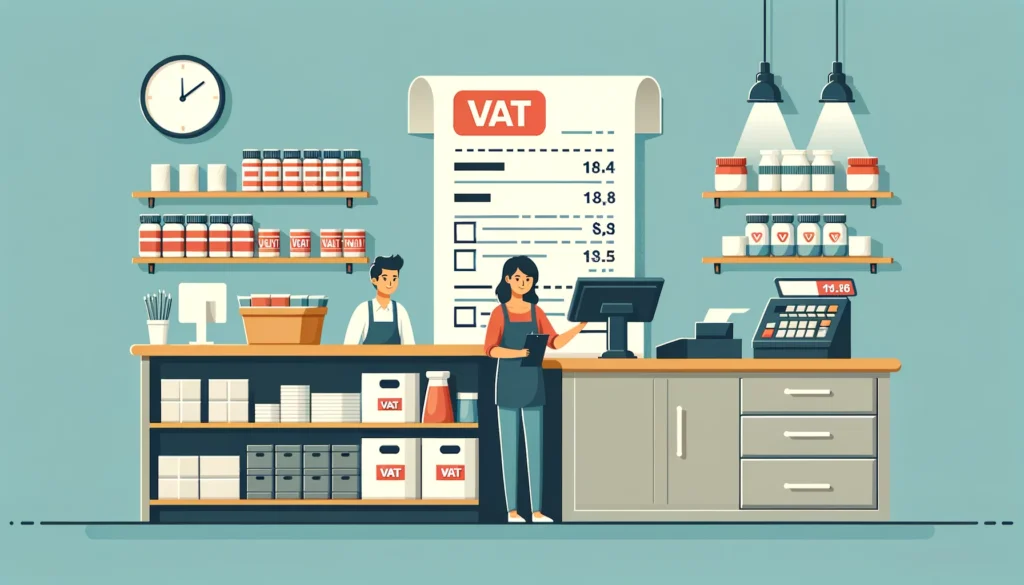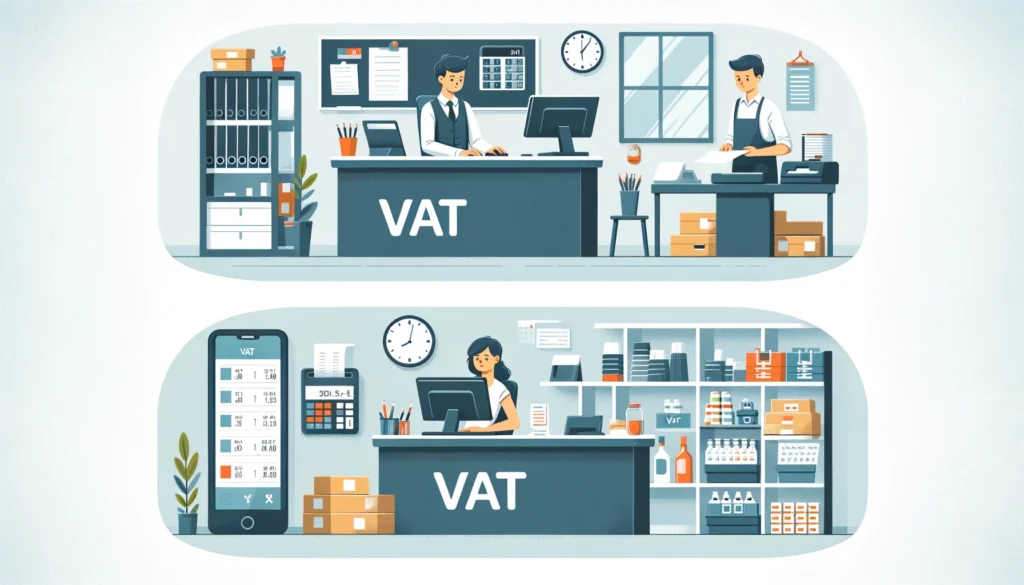To provide you with the best possible user experience, we use cookies and similar technologies. These include cookies for the operation and optimization of the website and for advertising tailored to your online usage behavior.
VAT in Germany – All you need to know
Value Added Tax (VAT), known as Umsatzsteuer in Germany, is a consumption tax levied on the sale of goods and services within the country. As the largest economy in Europe, Germany’s VAT system is a significant part of its revenue generation, adhering to the EU’s VAT directives while incorporating its own regulations. Businesses operating in Germany, or those that are VAT-registered, must charge VAT on their sales, which is then passed on to the tax authorities. The standard VAT rate in Germany is currently 19%, with a reduced rate of 7% applicable to certain goods and services, such as food, books, and public transport, emphasizing the social policy to make essential items more affordable.
Understanding the Need for a VAT Number in Germany
In Germany, obtaining a VAT number is a pivotal step for any business engaging in taxable supplies of goods or services. The VAT number (Umsatzsteuer-Identifikationsnummer or USt-IdNr.) is not only a tax identifier but also a key that unlocks the ability to trade across European Union borders.
For companies based in Germany, the requirement to register for a VAT number is triggered once their sales exceed the annual turnover threshold of €22,000 for new businesses or €50,000 for established businesses. This threshold is designed to exempt small traders from the complexities of VAT. However, regardless of turnover, if a business intends to trade with other EU countries, it must register for a VAT number. This process begins by applying to the local Finanzamt (tax office), where the company is headquartered.
In the application, businesses must furnish comprehensive details, including corporate documentation, expected turnover, and a description of business activities. For foreign entities seeking to engage in economic activities in Germany, the process can be more intricate.
These entities are typically required to appoint a fiscal representative—a resident intermediary who liaises with tax authorities and ensures VAT compliance on their behalf. The fiscal representative bears a significant responsibility, as they can be held liable for the VAT debts of the non-resident company they represent.
Once the application is submitted and processed, the German tax authorities issue a unique VAT number, which not only serves as a registration for domestic sales but also facilitates the company’s participation in the EU’s single market system known as the VIES (VAT Information Exchange System), enabling intra-community transactions to be properly recorded and taxed.

How to get a VAT Number in Germany
- Gather Required Documentation:
- Acquire the company’s articles of association.
- Obtain proof of registration from the commercial register (Handelsregisterauszug).
- Collect detailed information about the company’s managing directors.
- Prepare a comprehensive description of your business activities.
- Submit the Application:
- For digital submissions, apply through the BZStOnline-Portal.
- If submitting physically, mail the necessary documents to the Bundeszentralamt für Steuern (Federal Central Tax Office).
- Application Review by the Bundeszentralamt für Steuern:
- Wait for the office to review the application for completeness and compliance.
- Be prepared to provide additional information if requested, to clarify business operations.
- Receive Your VAT Number:
- Once approved, the Bundeszentralamt für Steuern will issue a VAT number (Steuernummer).
- This number should be used in all business invoices and tax-related communications.
- Additional Steps for Non-Resident Businesses:
- Non-resident businesses may need to appoint a local fiscal representative.
- Complete and submit a different set of forms designed for foreign entities.
Following these steps helps streamline the process of VAT registration in Germany, ensuring legal compliance and operational readiness for tax obligations.
Tax Representation in Germany for Non-EU Businesses
For non-EU businesses operating in Germany, navigating the VAT landscape can be complex, particularly due to the requirement of appointing a fiscal representative. This representative acts as a liaison between the company and German tax authorities, handling VAT registration, return filings, and payments.
The fiscal representative must be established in Germany and is typically a tax advisor or a company that specializes in tax representation. A crucial element of this arrangement is the representative’s joint and several liability for the VAT debts of the non-EU business they represent.
This means if the non-EU entity fails to comply with VAT obligations, the German authorities may hold the fiscal representative accountable. This level of responsibility underscores the importance of choosing a reliable and competent representative. Additionally, the fiscal representative helps navigate the intricacies of tax compliance, including adherence to evolving regulations and the correct application of VAT across various transactions.
Need help with Tax & Accounting? Get in touch with our Experts
Filing VAT Returns in Germany
VAT returns must be filed periodically – usually monthly or quarterly – depending on the size of the business. In these filings, businesses must detail all taxable sales and purchases, applying the correct VAT rates. The VAT return process is increasingly digitized, with the ELSTER platform being the primary means of submission. This platform ensures the secure transmission of tax data and facilitates a more efficient process. Late filings or underpayment of VAT can result in penalties, making accurate bookkeeping and timely submissions essential. The German tax year aligns with the calendar year, and annual summaries are also required, which provide an overview of the VAT accounted for throughout the year.

VAT Refunds for Businesses and Individuals
Both businesses and individuals may be entitled to VAT refunds under certain conditions. Businesses can reclaim VAT paid on business-related purchases, which is deducted from the VAT they owe on sales.
For individuals, particularly non-EU residents, VAT refunds are available for goods purchased in Germany and taken out of the EU within three months of purchase. The refund process involves presenting receipts and proof of export to customs upon departure, followed by submitting a claim through the retail store or a VAT refund service provider.
VAT Record Keeping in Germany
Effective VAT management in Germany requires meticulous record-keeping. Companies are legally required to retain all records pertaining to VAT for a minimum of ten years.
This period ensures that during any financial audit, the tax authorities, known as the Finanzamt, have ample access to a company’s financial history to verify compliance with VAT regulations. Records must include all issued and received invoices, credit notes, import and export documentation, and proof of payment for VAT returns.
The German tax code also stipulates the use of proper accounting systems that can provide detailed transaction-level information for VAT purposes. Digital record-keeping is becoming increasingly prevalent, with specific electronic formats and standards set by the tax authorities to facilitate potential data retrieval.
Get in touch with our Team
Changes in VAT Regulation in Germany
The dynamic nature of VAT regulations means that businesses operating in Germany must remain vigilant and adaptable to stay compliant.
Changes can arise from new EU directives aimed at harmonizing VAT across member states, from domestic policy decisions, or as part of efforts to curb tax evasion and fraud. For example, recent years have seen a shift towards more stringent reporting requirements and the introduction of real-time reporting systems in some cases. These changes often come with a need to update internal processes and systems to meet new legal standards.
Additionally, the economic landscape can influence VAT rates and thresholds, as seen with temporary rate adjustments during economic crises to stimulate spending. Companies must actively monitor these changes, which may involve subscribing to tax law updates, participating in industry forums, or engaging with professional tax advisors.
Proactivity in this area not only ensures compliance but can also provide businesses with planning opportunities to optimize their tax positions.
VAT on E-commerce
The e-commerce sector has seen exponential growth, and with it, the regulatory framework for VAT on digital sales has evolved. The European Union, to which Germany is a key member, has implemented reforms to simplify VAT for e-commerce businesses and ensure that VAT is paid where consumers are based.
The introduction of the One Stop Shop (OSS) regime allows businesses to register for VAT in one EU member state and declare and pay VAT for all their EU sales through a single electronic portal. This system is particularly beneficial for businesses that sell to customers in multiple EU countries, as it reduces the administrative burden.
However, the threshold for distance selling, which previously allowed businesses to charge VAT at their own country’s rate until sales to a particular country exceeded a certain amount, has been removed. Now, VAT is due from the first euro of sales. This change necessitates that e-commerce businesses adapt their pricing strategies and checkout systems to account for varying VAT rates across the EU. Keeping abreast of these developments is crucial for e-commerce operators to maintain compliance and competitiveness in the European market.
Clevver, Your Partner for Tax & Accounting in Germany
Specializing in tax and accounting services in Germany, Clevver provides comprehensive support to navigate the country’s intricate tax system. Our Team expertise extends to adept handling of VAT registration, tax filings, and ensuring compliance with the rigorous German accounting standards.
Moreover, we offer remote Incorporation services and Virtual Offices in Berlin and worldwide, inclusive of Legal Addresses and Digital Mailboxes.
VAT in Germany – Frequently Asked Questions
What is the standard VAT rate in Germany?
The standard VAT rate in Germany is 19%. However, a reduced rate of 7% applies to certain essential goods and services, like food, books, and public transportation.
Who needs to register for VAT in Germany?
Businesses with a turnover exceeding €22,000 for new businesses or €50,000 for established businesses must register for VAT. Non-EU businesses engaging in taxable supplies to German customers also need to register.
How do I register for VAT in Germany?
Registration involves submitting an application to the Bundeszentralamt für Steuern, either via the BZStOnline-Portal or by mail. Required documents include company registration details, information about managing directors, and a description of business activities.
Can foreign businesses register for VAT in Germany?
Yes, foreign businesses can register for VAT in Germany. Non-EU companies often need to appoint a fiscal representative to handle VAT matters.
What are the VAT invoicing requirements in Germany?
VAT invoices must include the supplier’s and customer’s VAT numbers, date of supply, detailed description of goods or services, and the VAT amount. Electronic invoicing must comply with specific standards.
How often do I need to file VAT returns in Germany?
VAT returns are generally filed monthly or quarterly, depending on the size of the business. Annual VAT summaries are also required.
Can I claim VAT refunds in Germany?
Businesses can reclaim VAT paid on business-related expenses. Non-EU residents may claim refunds for VAT paid on goods purchased in Germany and exported out of the EU.
What happens if I don’t comply with VAT regulations?
Non-compliance can lead to penalties, interest charges, and legal consequences. Accurate record-keeping and timely VAT payments are crucial.
Is electronic VAT filing available in Germany?
Yes, VAT returns can be filed electronically via the ELSTER platform, which ensures secure and efficient transmission of tax data.
Do I need to charge VAT on online sales to German customers?
If you are selling goods or services online to customers in Germany, you are generally required to charge VAT at the applicable rate.
What is the reverse-charge mechanism in Germany?
Under the reverse-charge mechanism, the responsibility for reporting the VAT transaction shifts from the seller to the buyer, typically in B2B transactions involving services or certain goods.
How do I deregister for VAT in Germany?
To deregister, you need to submit a request to the Bundeszentralamt für Steuern, explaining the reasons for deregistration, such as ceasing taxable activities or falling below the turnover threshold.
